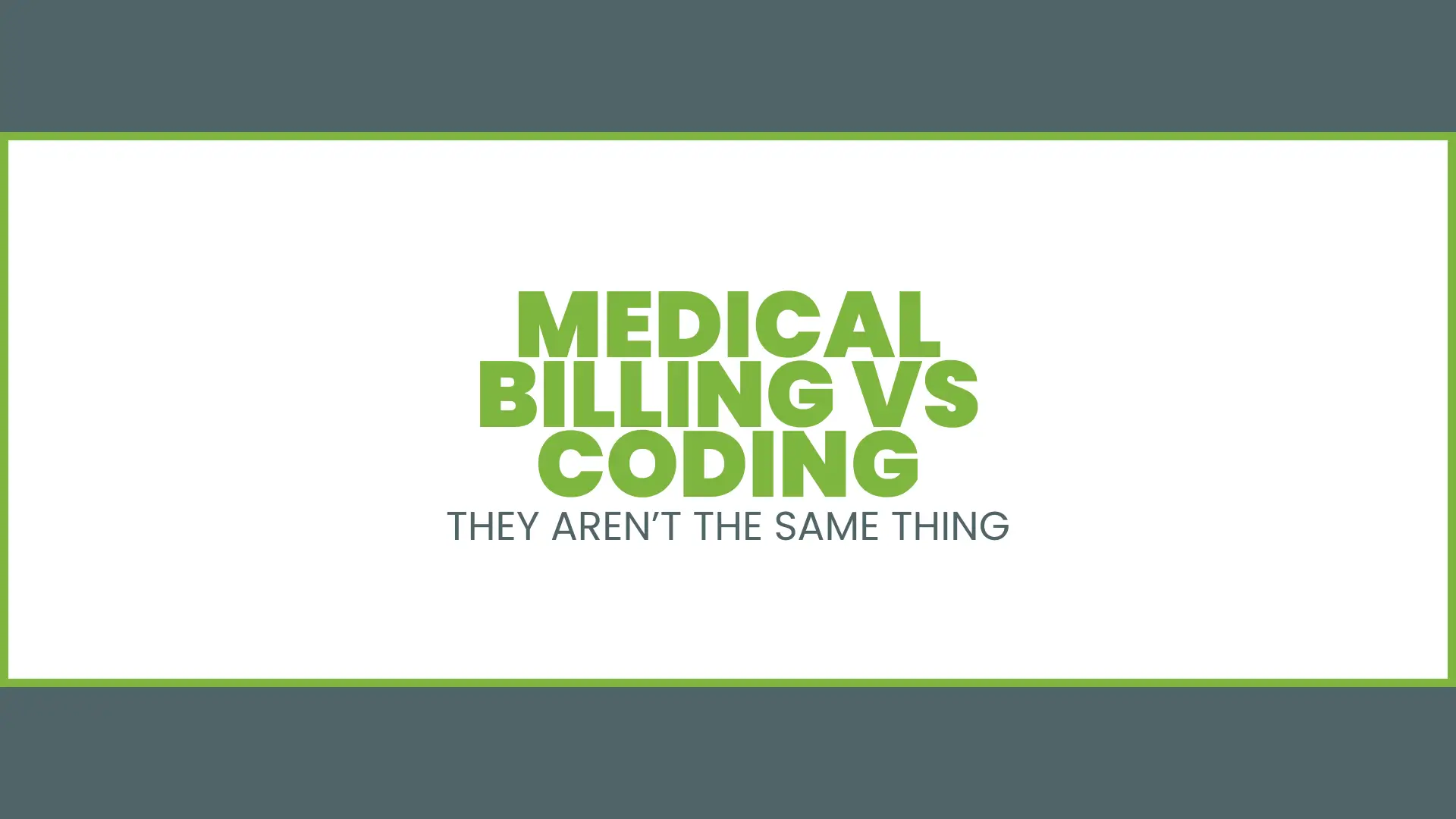In a world full of healthcare, medical billing, and coding have their own identity. However, they are often misunderstood and thought to be the same. They are both complex but play an essential role in managing the revenue cycle for physicians. These functions make sure that healthcare providers are paid timely for their services and that healthcare claims are reimbursed. But how can someone differentiate medical billing vs medical coding but just knowing them by name?
Although they serve very different purposes, if you want to pursue your career in medical billing or medical coding or simply are curious to know about both, understanding how both roles fit in this large healthcare system is crucial. In the article today, we will discuss the distinctive differences between medical billing and coding, the educational requirements for these roles, and how they pave the way to smooth out the operation of healthcare practices. We have already covered a blog to know the basics of Medical Coding and Billing here. So, also check this one and happy reading!
What Is Medical Billing?
Medical billing is the process of generating healthcare claims and submitting them to insurance providers to get paid for the services rendered by healthcare organizations or physicians. These claims are based on the standards and guidelines set by AMA and healthcare authorities of the United States.
These standards rely on the diagnostic and procedural codes, which help medical billers to process the claims for every service rendered. With this, providers ensure they get paid for their time and services. Read this blog to know how does it actually works!
Key Responsibilities of a Medical Biller
The financial aspect of a healthcare organization is managed by a medical biller. They are responsible for:
1. Submitting Claims:
The process starts with preparing and submitting medical claims to the insurance provider. Once a medical provider provides the services, the medical biller prepares a claim mentioning all the services and treatments incurred by the patient during the hospital visit or stay. The claims have all the necessary details, along with the patient policy information.
2. Follow up on claims
If the insurance claim is denied or rejected, the medical biller further follows up on the reasons for the denial and works to resolve discrepancies and issues with the insurance company.
3. Patient communication
It is easy for the medical billers to communicate with the patients as they know what they are billed for. They interact to explain to patients their financial liability against the medical bills. Their responsibilities also include setting up payments, explaining bills, and answering patient queries.
Skills and Tools Needed
As medical bills involve a lot a procedural and diagnostic codes, this is why it is essential for billers to use updated technology to optimize and expedite the tiring billing process. Apart from being tech-savvy, medical billers must have knowledge about insurance policies, healthcare laws and an understanding of medical terminologies to process the claims accurately.
Also, for successful billing functions, attention to detail, strong ability to navigate through different insurance policies, and organizational skills are crucial for a medical biller.
What Is Medical Coding?
Coding in medical language refers to the transformation of medical procedures, treatments, services, and diagnostics into standardized codes. These codes are classified as ICD–10 (International Classification of Diseases) or CPT (Current Procedural Codes). Both ICD and CPT codes are used by healthcare organizations and physicians to bill insurers and document the provided service to receive timely reimbursements.
Key Responsibilities of a Medical Coder
The responsibilities of a medical coder involve assigning accurate medical diagnoses and procedural codes in medical claims. Some of their day-to-day tasks include;
1. Assigning Codes
Codes are based on the medical procedure or diagnoses of the patient. Coders review patient’s medical records thoroughly and assign accurate codes for each service. They ensure every code is correct and represents the service.
2. Ensuring Compliance
It is crucial for coders to follow the federal guidelines and insurance company requirements to avoid compliance issues. These compliance standards are essential to reduce claim denials and avoid fraudulent claim audits.
3. Maintaining and Updating Codes
Medical billing codes change frequently, and updates for the codes, including ICD-10, CPT, and HCPCS (Healthcare Common Procedure Coding System). Coders also need to keep maintaining these codes according to the latest updates.
Skills and Tools Needed
Coders normally use EHR systems to monitor, update, and assign medical codes to treatments and diagnoses. This is why coders need to be very vigilant about using the correct codes with the right medical terminology, depending on the coding system. Certification in medical coding, such as Certified Coding Specialist (CCS) or Certified Professional Coder (CPC), is often asked before hiring a medical coder. Additionally, coders must know the privacy laws and standards of healthcare regulations.
Medical Coding vs Medical Billing – Key Differences
1. Core functions
Medical billing:
The main purpose of medical billing is to make sure that providers and healthcare organizations are reimbursed for their services. Medical billers bear the financial responsibility of preparing medical bills and claims, submit to insurance providers, and follow-up on these claims. So, if you want to outsource your billing words then read this one!
Medical coding:
The basic and important function of medical coding is to translate the procedures, treatments, and diagnoses in to correct codes. These codes are universally recognized and are used in medical claims according to medical records.
2. Interdependence of Medical Billing and Medical Coding
Although the roles of medical coders and billers are distinct and separate, they are interconnected in many aspects. Without correct codes, the billing process remains incomplete, with a high chance of getting rejected. For example, if wrong procedural or diagnosis codes are applied, the insurance claims will have a high potential to get rejected or reimbursed at a low rate, eliminating the codes that are wrongly applied. On the other hand, inaccurate billing may lead to payment delays or underpayments, and it doesn’t matter if the coding is accurate.
3. Education and Certification Requirement For Medical Billers And Coders
Educational Requirements
Medical billing and coding don’t require as much extensive education as medical providers do. However, both roles typically require educational degrees, including:
Medical billing:
A high school diploma and a short- term certified program is required for medical billers in healthcare administration. College degrees are also considerable for billers in healthcare information management.
Medical coding:
Coders normally come from similar educational backgrounds. However, coding programs are more focused on teaching coding systems’ functions. Certificate programs in medical coding are common, and some coders pursue an associate degree in health information technology.
4. Certification and Professional Development
Medical Coding Certification:
Common certifications include Certified Professional Coder (CPC), Certified Coding Specialist (CCS), and Certified Inpatient Coder (CIC). These certifications are offered by organizations like the American Academy of Professional Coders (AAPC) and the American Health Information Management Association (AHIMA).
Medical Billing Certification:
While not always required, certifications can increase job prospects. Certifications such as Certified Medical Reimbursement Specialist (CMRS) or Certified Billing and Coding Specialist (CBCS) are valuable.
Common Misconceptions about Medical Billing and Coding

Myth#1
Medical billing and coding are the same procedures
Many times, people interrelate both medical billing and coding to each other and misunderstand the concepts behind it. Medical billing is the process of submitting and following up on insurance claims, while medical coding is the process of translating codes into procedures and diagnoses.
Myth#2
Medical billers and coders require the same skill set
Although medical billers and medical coders must have some basic knowledge of medical terminologies, but their required skills are different. Medical billers need strong communication and organizational skills while medical coders need a deep understanding of coding systems, medical anatomy, and procedures.
Myth#3
Either biller or coder, one role is required to process the reimbursement
Medical billing and coding go hand in hand. Medical billing is incomplete if the codes are incorrect and remain nonpaid. Medical coding cannot be processed if the diagnoses and treatments are not detailed properly.
Conclusion Medical Billing vs Coding
Anyone interested in a career in healthcare administration must comprehend the difference between medical billing vs coding. Despite their apparent similarities, the roles each call for unique abilities and expertise.
Both roles guarantee that healthcare practitioners are paid for the services they deliver and are essential to the operation of healthcare practices. Regardless of whether you’re thinking about a career in medical billing or coding, both provide chances for advancement.
FAQs – Medical Billing vs Coding
Is it better to be a medical biller or coder?
Every job, including medical billing and coding, depends on your interest. If you prefer working with the financial tasks like preparing insurance claims and patient billing, then becoming a medical biller can be a good option for you. On the flip side, if your interest is in coding documents for procedures and diagnosis then medical coding would be a better choice. Both roles offer striking career opportunities.
What is the downside of medical coding?
The downsides of medical coding include the stress of maintaining accuracy, the need for continuous education due to frequent updates, repetitive tasks, and the potential for burnout from high volumes of work.
Do medical billers make more than coders?
Generally, medical coders tend to make slightly more than medical billers, as coding requires more specialized knowledge and technical skills. However, salaries can vary based on experience, certifications, and location.
Can a medical biller also be a coder?
Yes, many medical billers also take on coding responsibilities. However, each role requires specialized training and certification, so it’s important to understand the complexity of both tasks.
What is the average salary of a medical biller vs. a medical coder?
The average salary for a medical biller is around $45,000 annually, while medical coders typically earn slightly more, with an average salary of $50,000 per year. However, salaries can vary based on location, experience, and certification.
How long does it take to become certified in medical billing or coding?
Certification can take anywhere from a few months to a year, depending on whether you pursue a certificate or degree and how much time you can dedicate to your studies.

